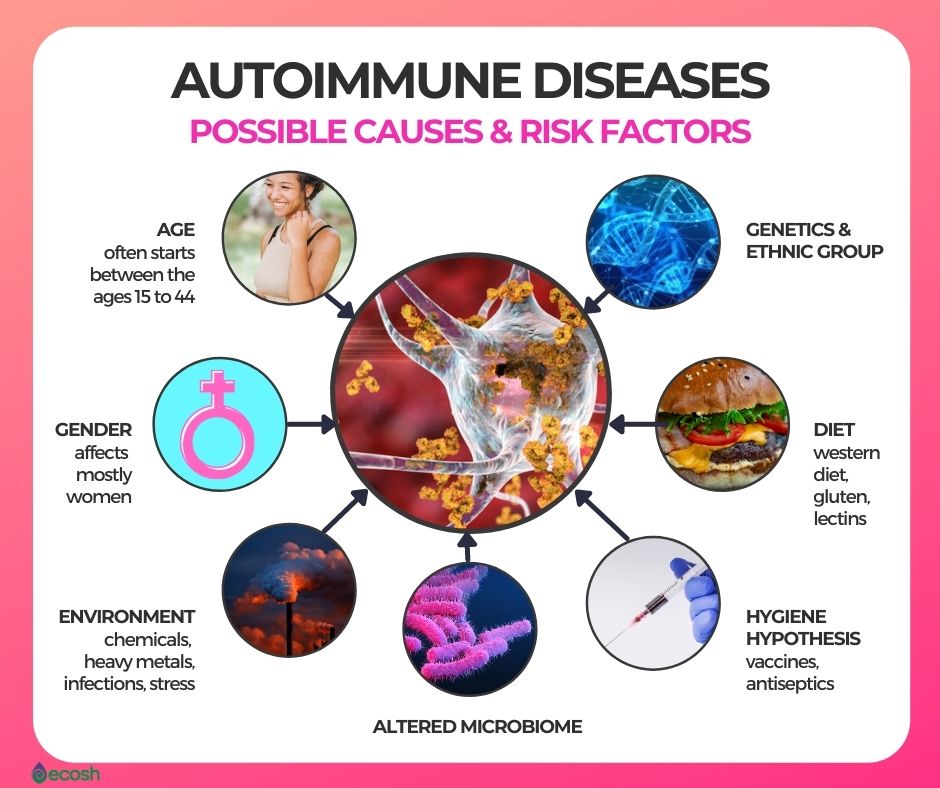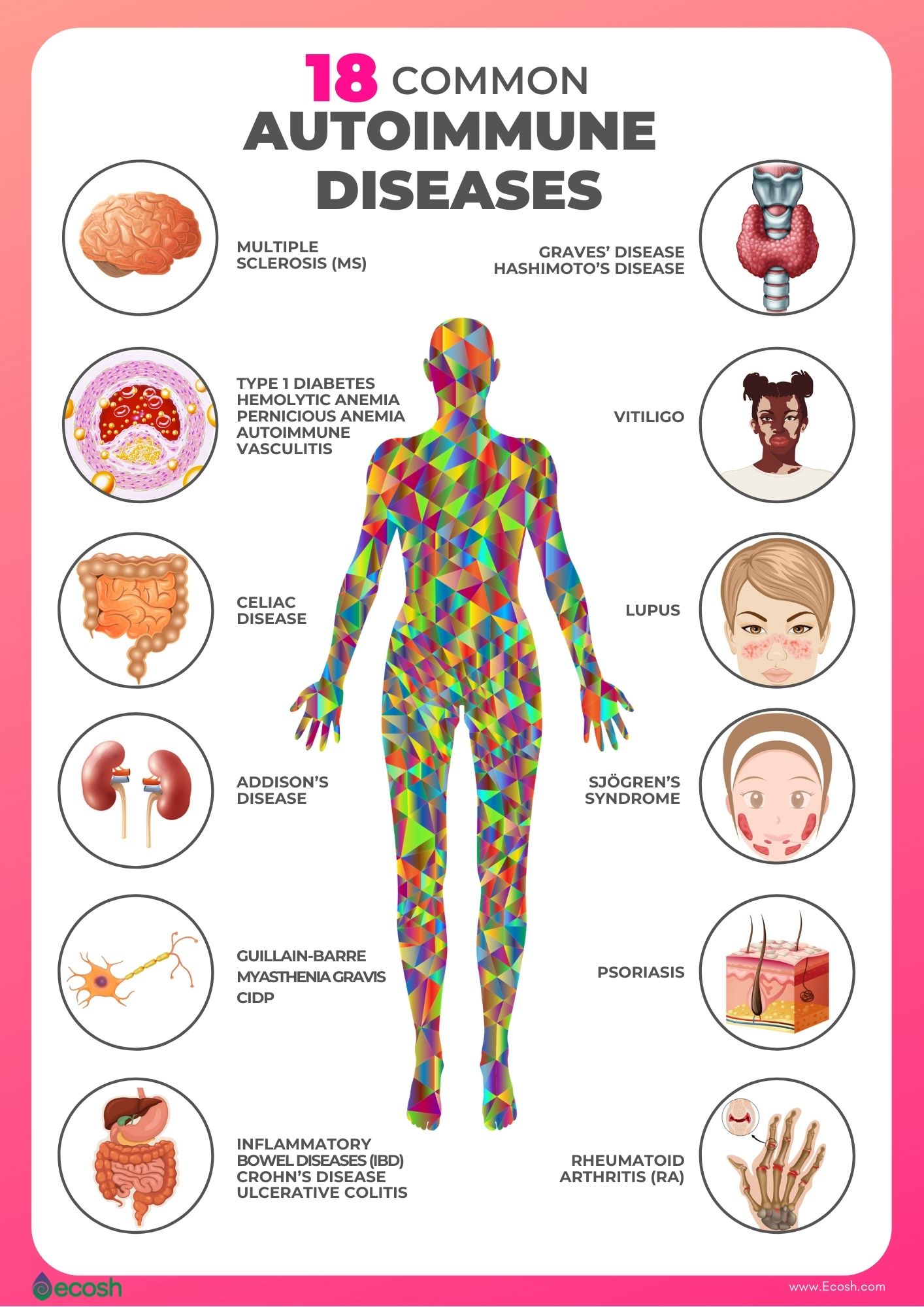Treatment for autoimmune disease is a complicated topic, as according to conventional medicine, these diseases are not curable. However, there are theories according to which you may be able to effectively alleviate or even cure some autoimmune diseases with some supplements and changes in diet.
Autoimmune diseases are diseases in which your immune system, which normally attacks invaders such as the viruses and bacteria, mistakenly attacks healthy cells in your own body. Almost 4 percent of the people worldwide are influenced by one of more than 100 different autoimmune diseases, the most frequent of which are type 1 diabetes, multiple sclerosis, Crohn’s disease, rheumatoid arthritis, lupus, psoriasis and scleroderma. At least 85% of patients with thyroiditis, systemic sclerosis, systemic lupus erythematosus and Sjögren’s disease are women.
The exact causes and mechanisms of autoimmune diseases are still unknown. However, as epidemiological data show a steady rise in autoimmune diseases in Western societies in recent decades, some researchers suggest a stronger influence of environmental rather than genetic factors in the development of autoimmune diseases than previously thought. Some autoimmune diseases affect only one organ (for example, type 1 diabetes affects the pancreas), while others (such as systemic lupus erythematosus (SLE)) attack the whole body.
Although modern medicine cannot completely cure most autoimmune diseases, it is possible to control symptoms and live a virtually full life with the disease. However, there are also theories about natural treatment of autoimmune disease according to which you may completely cure or at least alleviate autoimmune diseases with supplements and simple changes in diet (1, 28, 29, 30, 31).

Possible Causes, Risk Factors and Risk Groups of Autoimmune Diseases – Why The Immune System Attacks Your Own Healthy Cells?
The immune system can usually tell the difference between foreign cells and your own cells. However, in case autoimmune disease, your immune system mistakenly considers a part of the body, such as the joints, skin, nerves, thyroid, adrenal glands or blood cells, as foreign.
Therefore, it sends autoantibodies (proteins) to attack your own healthy cells. There is still no consensus among scientists about why the immune system, which is designed to protect humans from viruses and pathogens, will misbehave in this way and attack human own healthy cells.
However, there are various theories and it has been observed that some people may be at higher risk of developing autoimmune disease than others:
Gender. It has been observed that women suffer from autoimmune diseases about twice as often (6.4% of women vs. 2.7% of men) than men. But why is that? According to Dr. Gundry, one possible explanation is that a woman’s immune system must be able to do two things that are completely opposite. First, always monitor for pathogens such as bacteria, viruses and parasites, but at the same time focus on completely ignoring the largest parasite of all time during pregnancy. According to Dr. Steven Gundry, it might be precisely this dual role, along with a number of other factors, that may contribute to the confusion of the immune system in women (1, 25, 28).
Age. In women, autoimmune disease often begins between the ages of 15 and 44 (1, 25).
Ethnic group. Some autoimmune diseases are more common in specific ethnic groups. For example, lupus affects African Americans and Hispanics more than Caucasians (1).
Genetics. Some autoimmune diseases, such as multiple sclerosis (MS), as well as lupus, tend to run in families. This does not mean that every member of the family has the same disorder, but they may inherit a predisposition to autoimmune disease (1).
The environment. As the prevalence of autoimmune diseases increases rapidly, researchers believe that environmental factors such as exposure to chemicals, heavy metals or solvents and infections may also increase the risk of developing autoimmune diseases (1).
Nutrition. Although it is not yet scientifically proven, researchers suspect that the “Western diet” may be another major risk factor for developing an autoimmune disease. This is because processed, high-fat, and high-sugar foods can be associated with inflammation in the body, which in turn can trigger an immune response (1, 26).
Gluten and lectins in food. Most believe that autoimmune diseases are the result of an attack by the immune system on a person’s own cells. However, according to Dr. Steven Gundry, the real reason for this may be a false identity when immune cells attack the body’s proteins, as they bear a strong resemblance to the proteins in lectins. The result is an attack on itself due to molecular similarity. In his view, this is a classic plant strategy that makes predators (in this case humans) suffer, or otherwise encourage these predators to eat something else, because these plants do not want to be eaten. Autoimmune diseases are difficult to understand precisely because they have so far been misunderstood and treated incorrectly (28).
Altered microbiome. Due to the proliferation of our modern food, some drugs such as Advil and Aleve, and antibiotics (both during treatment and by eating the meat of animals to whom antibiotics have been administered), our microbiome has completely changed, making autoimmune diseases more prevalent now than ever before (28).
Hygiene hypothesis. According to this hypothesis, low exposure to dirt, or all kinds of bacteria and microbes, are good for the development of our immune system. However, due to antiseptics, antibacterial cleaners and vaccines, children are not exposed to as many microbes today as they used to. Therefore, some researchers suspect that lack of exposure to microbes may make their immune system prone to overreacting to harmless substances (1, 27).

Natural Treatment, Herbal Remedies, Nutrients, Vitamins, and Diet for Autoimmune Disease
As conventional medicine cannot cope with and treat autoimmune diseases effectively, many patients turn to diet and lifestyle changes, as this is something they can actually control. According to Dr. Steven Gundry, who has been treating these severe cases throughout his career, autoimmune diseases may have their roots in our gut microbiome.
He says, environmental factors and nutrition affect not only human genes, but also the genes of our microbiome. These trillions of bacteria and viruses that live in the gut and skin. Both his own research and the work of others show that nutrition, supplements, the environment and even light have a powerful effect on the activation of genes of microorganisms living in the gut.
Humans are a superorganisms, a symbiotic living mixture that constantly receives information from the environment and manipulates both – our human genes and the genes of bacteria and viruses in response to this information.
Since bacterial and viral genes make up 99 percent of our combined genes (we only have 1% human genes and 90% human cells), everything that happens to us begins in the gut.
According to Dr. Steven Gundry, he has not yet seen an autoimmune disease in which the symptoms cannot be temporarily eliminated or alleviated (remission) or completely cured with supplements and simple dietary changes (28).
After years of researching tens of thousands of patients, treating them with diet and supplements, and monitoring their changes (partly through the blood), Dr. Steven Gundry thinks, supplements are important, but the first step in any treatment program is to eliminate the foods that might be causing the problem. Therefore, not only what you eat plays an important role, but also what you do not eat.
Dr. According to Steven Gundry, autoimmune disease comes from the gut and also the treatment of autoimmune disease should start from the gut. Therefore, if you have an autoimmune disease, treat your gut and this disease will subside (28).

Although the treatment of each autoimmune disease may differ, we will list Dr. Steven Gundry’s general recommendations for the natural treatment and alleviation of autoimmune diseases:
1. Consume enough vitamin D
Have your vitamin D levels tested. If your vitamin D level is below normal, continue taking vitamin D to at least 70 ng/ml, and even better, to 100 ng/ml. According to Dr. Steven Gundry, most people should take at least 5,000 international units (IU) of vitamin D3 a day, but people with autoimmune disease should start with 10,000 IU a day. Although it is a common truth that such amounts may cause adverse side effects and toxicity, Dr. Steven Gundry says, he has not yet seen any toxic symptoms among his patients.
2. Avoid foods containing gluten and lectins
According to Dr. Steven Gundry, some of the biggest food traps often involve eating so-called healthy foods that people are never really meant to eat. As hard as it is to believe, he says, some plants don’t want to be eaten because they were here on earth first! So they protect themselves by placing proteins called lectins in their leaves and seeds. Gluten is by far the most famous lectin, but most people don’t know that it actually has a fairly negligible effect and that most of the nutrients eaten instead of gluten-containing foods contain much worse lectins. Half of his patients with autoimmune disease had previously avoided gluten, but did not completely recover until other lectins were removed from their daily menu.
For example beans, peanuts, lentils, eggplant, fruits, quinoa, corn, legumes, potatoes, tomatoes, peppers, etc. are full of lectins. According to the Centers for Disease Control and Prevention (CDC), 20-30 percent of all food poisonings in the United States are related to lectins in not enough cooked beans. So it really seems that some plants just don’t want their seeds to be eaten. Cooking beans reduces the amount of lectin, although some of them remain. Therefore, in addition to the vitamin D test, ask your doctor to order a test for Adiponectin and TNF-alpha levels. If either of these is elevated (adiponectin greater than 16, TNF Alpha 2.9 or higher), consider avoiding major lectin-containing foods in the future.
3. Consume prebiotic foods
Your microbioma loves prebiotics. Prebiotics are mainly soluble fibers and resistant starches that are not digested by intestinal enzymes. But they are exactly the foods our intestinal buddies need for developing and growing. Moreover, the more you eat such good prebiotic food, the less likely it is that bad bacteria will predominate because they will not be able to digest these prebiotics. Prebiotic foods include, for example, onions, garlic, leeks, dandelion leaves (which you can use in salads), asparagus, bananas and apples.
4. Consume foods that contain polyphenols
You and your microbiome are dependent on plant compounds called polyphenols. These are dark pigments in berries, chocolate, and coffee beans that manipulate both you and your microbiome genes to improve a number of inflammatory markers. Grape seed extract, pycnogenol (a natural antioxidant produced from French maritime pine bark), turmeric and green tea extract are very good sources of polyphenols and for the natural treatment for autoimmune disease. You could also eat a piece of dark chocolate (at least 72 percent) daily. Really good olive oil is also an amazing source of polyphenols (28).
Dr. Gundry is the founder and director of the Center for Restorative Medicine in Palm Springs and Santa Barbara and the director of the International Heart & Lung Institute in Palm Springs, California. You can read more about the role of our daily diet from the books he wrote:

Most Common Autoimmune Diseases
1. Type 1 diabetes
In type 1 diabetes, the immune system antibodies attack and destroy the hormone insulin-producing cells in the pancreas. Without the necessary amount of insulin, glucose builds up in the bloodstream instead of going into the cells. This buildup of glucose in the blood is called hyperglycemia (the technical term for high blood glucose (blood sugar)). High blood sugar may damage blood vessels and organs like heart, kidneys, eyes, and nerves. Individuals with type 1 diabetes need insulin injections to survive (1, 6).
2. Rheumatoid arthritis (RA)
Rheumatoid arthritis is a chronic inflammatory autoimmune disease which occurs when your body’s immune system mistakenly sends antibodies to the lining of your joints, and attacks its own healthy body tissue. In some people, this disorder can affect more than just joints and may also damage other body systems, including the eyes, skin, lungs, blood vessels and heart.
Rheumatoid arthritis affects the lining of your joints, and causes a painful swelling that can finally lead to bone erosion, joint deformity and physical disabilities (7). Although new types of medicines have improved treatment options dramatically, in addition to medications you may find relief also in natural autoimmune disease treatment methods such as dietary changes, home remedies, and certain supplements.
3. Psoriasis and psoriatic arthritis
Psoriasis is a common chronic skin condition that causes raised, red, scaly patches (commonly with silver-white scales of plaque) on the skin and occurs approximately in 2 to 2.6% of the US population. This skin disease accelerates the life cycle of skin cells. It causes skin cells to multiply too quickly and build up rapidly on the surface of the skin. Psoriasis may take shape in various forms, each with its own symptoms and seriousness level. For instance, psoriasis is often considered as only a skin condition, however, it can also cause psoriatic arthritis which affects about 30% of people with psoriasis and causes swelling, stiffness and pain in the joints.
Patients with psoriasis often have a liver disease and deficiencies in bile acids, weakened intestinal barrier, or a leaky gut syndrome. Therefore, there can be many different accompanying health conditions. Conventional treatment can be very useful. However, sometimes it’s not the only solution or only gives a non-permanent effect as it does not treat the cause of the disease. Therefore, there are also many natural remedies for your overall health to relieve this disease, and psoriasis diet is one of them (5).
4. Lupus (Systemic Lupus Erythematosus, or SLE)
Lupus is considered a chronic disease that causes inflammation of connective tissues. However the causes of lupus are unknown. It can influence any organ in your body including kidneys, joints, lungs, walls of blood vessels, heart, etc. Lupus often mimics the symptoms of some other health conditions, such as tiredness, joint pain, swelling, rash, and fever. The symptoms of lupus may vary from person to person depending on the weakest place of the individual.
Some will have more external symptoms, such as rash on the skin, while in others the disease manifests itself internally. About 1.5 million people suffer from some form of Lupus in the United States, including some of the well known artists. The disease is more common in women (90% of lupus patients are women), and especially among young women. Also the risk of illness is higher if the disease has previously occurred in the family (1, 4).
5. Multiple sclerosis (MS), also known as encephalomyelitis disseminata
MS is a potentially disabling, demyelinating disease in which the protective coating of nerve cells in the spinal cord and brain are attacked by the immune system and damaged. Demyelinating disorders are conditions that damage myelin, the insulating covers that surrounds nerve cells, in your central nervous system. This damage to the myelin disrupts the capability of parts of the nervous system to transfer signals between your brain and the rest of your body. MS has a wide range of signs and symptoms, including physical, mental, and sometimes psychiatric problems.
Some symptoms may include numbness, muscle weakness, double vision, blindness in one eye, balance issues, and troubles with walking, sensation or coordination. MS takes several forms. Each form progress at different rates with new symptoms either occurring in isolated attacks (relapsing forms) or building up over time (progressive forms). Between attacks, symptoms may disappear completely. However, persistent neurological issues often remain, especially as the disease progresses. About 50% of MS patients need help walking within 15 years after the disease starts (1, 8, 9).
6. Graves’ disease
Graves’ disease is a disorder that affects about 1 in 200 people, and is the most common cause of overactive thyroid (hyperthyroidism). Meaning, in Graves’ disease, your immune system attacks the thyroid gland in the neck and causes it to produce way more thyroid hormone than your body actually requires. The thyroid is a butterfly-shaped gland that`s located low on the front of the neck below your Adam’s apple. It controls your metabolism with a few specific hormones which are created by the thyroid. These hormones tell your body’s cells how much energy to use. Therefore, thyroid hormones affect just about every organ in your body. Even the way your heart beats. So, too much thyroid hormones may cause symptoms such as a fast heartbeat, nervousness, weight loss and heat intolerance.
Without treatment, hyperthyroidism may lead to severe complications with the heart, bones, muscles, menstrual cycle, fertility, and cause health problems for the mother as well as for the baby during pregnancy. Graves’ disease also can affect your eyes (also called Graves’ eye disease, Graves’ ophthalmopathy or Graves’ orbitopathy), which occurs in around 30% of those who have Graves’ disease, or/and skin (Graves’ dermopathy). Graves’ disease is a serious health condition and needs to be treated by your healthcare provider. However, along with conventional treatment you may find help in some vitamins, lifestyle changes, home remedies, and changes in diet (10, 11).
7. Hashimoto’s thyroiditis, also called Hashimoto’s disease
Hashimoto’s thyroiditis is a disease in which the immune system attacks your thyroid, and causes the production of thyroid hormone to slow down to a deficiency. Inflammation from Hashimoto’s disease (chronic lymphocytic thyroiditis), frequently leads to an underactive thyroid. Therefore, Hashimoto’s disease is the most common cause of hypothyroidism (underactive thyroid). Symptoms of Hashimoto’s disease mostly include fatigue, swelling of the thyroid (goiter), weight gain, hair loss and sensitivity to cold.
It typically affects middle-aged women but can also happen in children, and in men and women of any age. Treatment for Hashimoto’s disease with thyroid hormone replacement is usually simple and effective. In addition, you may find some help in natural autoimmune disease treatment possibilities such as alternative medicine, Hashimoto’s diet and certain supplements (1, 12).
8. Inflammatory bowel disease
Inflammatory bowel disease (IBD) is a term for two conditions that cause inflammation in the lining of the intestinal wall. This prolonged and continuous inflammation leads to gastrointestinal tract damage. In addition to conventional medicine, you may find help also in some natural autoimmune disease treatment methods like changes in diet and taking some supplements. Each type of IBD affects a different part of the GI tract:
- Ulcerative colitis. Affects the lining of the large intestine (colon) and the rectum.
- Crohn’s disease. Can inflame any part of the GI tract (from the mouth to the anus). Most often it affects the portion of the small intestine before the large intestine/colon (13).
9. Addison’s disease, also called adrenal insufficiency
Addison’s disease is an uncommon condition that affects the adrenal glands (located just above the kidneys), which produce the hormones cortisol and aldosterone as well as androgen hormones. Therefore, in Addison’s disease when adrenal glands are affected – your body doesn’t make enough of these hormones such as cortisol and, often, also aldosterone anymore. Deficiency of cortisol can influence the way the body uses and stores carbohydrates and sugar (glucose).
Having too little of aldosterone will cause sodium loss and excess potassium in the bloodstream. Symptoms of Addison’s disease include low blood sugar, weakness, fatigue, and weight loss (1, 14).
10. Sjögren’s syndrome (SjS, SS)
This is a long-term autoimmune disease that influences the body’s moisture-producing (lacrimal and salivary) glands. These glands provide lubrication to the eyes and mouth. Sjögren’s syndrome also often severely affects other organs systems, such as the kidneys, lungs and nervous system. Main symptoms are dry eyes and mouth, fatigue and pain. Characteristic symptoms of Sjögren’s syndrome include dry eyes and dry mouth, but it may also affect the skin and joints (15).
11. Myasthenia gravis (MG)
Myasthenia gravis is a long-term neuromuscular autoimmune disease. It affects nerve impulses that help the brain control the muscles, and causes varying degrees of skeletal muscle weakness. The weakness gets worse with activity and improves with rest. The most commonly affected muscles are those that control facial movements, eye movements, eyelid opening, and swallowing. It can result in drooping eyelids, double vision, trouble talking, and problems with walking (16).
12. Autoimmune vasculitis, also called Vasculitis
In vasculitis the immune system attacks blood vessels. This causes inflammation and narrowing of blood vessels (arteries, veins and capillaries), therefore, allowing less blood to flow through them. As these vessels carry blood to and from the heart and the body’s organs, severe narrowing of blood vessels can lead to organ damage or death. This disorder can influence any organ, so symptoms vary widely and can happen almost anywhere in the body (3, 17).
13. Pernicious anemia
This is a disorder in which the body cannot make enough healthy red blood cells because it doesn’t have enough vitamin B12. This vitamin is naturally found in animal products, including fish, meat, poultry, eggs, milk, and milk products. Pernicious anemia causes deficiency of a protein, produced by stomach lining cells, known as intrinsic factor that is needed in order for the small intestine to absorb vitamin B-12 from food. Inadequate amounts of vitamin B12 will lead to anemia, and the body’s ability for proper DNA synthesis will be altered.
Your body also needs vitamin B12 to make healthy red blood cells and to keep its nervous system function properly. Pernicious anemia affects 0.1 % of people in general, but almost 2 % of people over age 60, therefore, this condition is more common in older adults (3, 18, 19).
14. Celiac disease
Individuals with celiac disease can’t eat gluten (a protein found in wheat, rye, barley and other grain products). Because, if they do so, and the gluten is in the small intestine, the immune system responds by attacking the small intestine, and causes inflammation and damage to this part of the gastrointestinal tract. Celiac disease affects only about 1% of people in the United States. Therefore, any gluten intolerance does not mean you have Celiac disease. Celiac disease can cause symptoms such as fatigue, weight loss, diarrhea, bloating and gas, abdominal pain, nausea and vomiting, and constipation (1, 20, 21, 22).
15. Guillain-Barre syndrome
Guillain-Barre syndrome is a rare condition in which your body’s immune system attacks your nerves controlling muscles in the legs and sometimes the arms and upper body. Usually the first symptoms are weakness (which can sometimes be severe) and tingling in your extremities. These sensations may rapidly spread, and finally paralyze your whole body. Symptoms include also rapid heart rate, and difficulties with facial movements, bladder control or bowel function, breathing and walking. Filtering the blood with a procedure called plasmapheresis is the main treatment for Guillain-Barre syndrome (3, 23).
16. Chronic inflammatory demyelinating polyneuropathy (CIDP)
CIDP is a neurological disorder in which similarly to Guillain-Barre syndrome, the immune system attacks your body’s nerves. But in case CIDP, symptoms last much longer. Depending on a person, symptoms may differ, but usually include tiredness and areas of pain and numbness. This disorder can slow your reflexes and make your arms and legs feel weak. If not diagnosed and treated early enough, around 30% of patients can become confined to a wheelchair. Treatment for CIDP and GBS are essentially the same (3).
17. Vitiligo
In case vitiligo, the immune system attacks the pigment cells (melanocytes) in the skin. This results in discolored patches in different areas of the body, including the skin, hair and mucous membranes (24).
18. Hemolytic anemia
Hemolytic anemia happens when the immune system demolishes your red blood cells. This destruction leads to an oxygen deficiency, which causes symptoms such as shortness of breath, dizziness, headache, cold hands or feet, fatigue, yellow whites of the eyes or skin, and cardiovascular problems, including heart failure (27).
NB! The information provided here is for informational purposes only. So do not consider it as health care or medical diagnosis and treatment. Do not consider this information as a guarantee of the results you want to achieve. In addition, this information is not intended to replace the advice of your physician or other healthcare professional.
Even more, you should not use it to diagnose or treat a health problem. Before changing your existing treatment, or taking any supplements, be sure to consult with your healthcare professional. Consult your doctor also before starting any diet or program, or if you suspect you may have a medical condition.
Compiled by Maria-Helena Loik
Pictures: Pexels.com, Pixabay.com, Shutterstock.com
Sources:
- Autoimmune Diseases, Types, Symptoms, Causes, Diagnosis & Autoimmune Disease Treatment (healthline.com)
- Autoimmunity and the Gut (hindawi.com)
- Autoimmune Diseases: What Are They? Who Gets Them? (webmd.com)
- Statistics, Facts and Figures of Lupus (verywellhealth.com)
- Is psoriasis a bowel disease? Successful treatment with bile acids and bioflavonoids suggests it is – PubMed (nih.gov)
- Hyperglycemia (High Blood Glucose) | ADA (diabetes.org)
- Rheumatoid arthritis – Symptoms and causes – Mayo Clinic
- Multiple sclerosis – Wikipedia
- Multiple Sclerosis Review (nih.gov)
- Graves’ ophthalmopathy. (nih.gov)
- Graves’ Disease | NIDDK (nih.gov)
- Hashimoto’s disease – Symptoms and causes – Mayo Clinic
- CDC -What is inflammatory bowel disease (IBD)? – Inflammatory Bowel Disease – Division of Population Health
- Addison’s disease – Symptoms and causes – Mayo Clinic
- Sjögren syndrome – Wikipedia
- Myasthenia gravis – Wikipedia
- Vasculitis (arthritis.org)
- Pernicious Anemia | NHLBI, NIH
- Optimal management of pernicious anemia – autoimmune disease treatment | JBM (dovepress.com)
- Gluten Intolerance | Celiac Disease – MedlinePlus
- Celiac disease and non-celiac gluten sensitivity | The BMJ
- Celiac disease – Symptoms and causes – Mayo Clinic
- Guillain-Barre syndrome – Symptoms and causes – Mayo Clinic
- Vitiligo: MedlinePlus Genetics
- Updated assessment of the prevalence, spectrum and case definition of autoimmune disease – ScienceDirect
- Role of “Western Diet” in Inflammatory Autoimmune Diseases | SpringerLink
- List of autoimmune diseases, with symptoms and treatments (medicalnewstoday.com)
- Autoimmune Disease Treatment & Diet – Can Autoimmune Disease Be Cured? | Goop
- The epidemiology of autoimmune diseases – PubMed (nih.gov)
- Autoimmune Disease Treatment – National Stem Cell Foundation
- The World Incidence and Prevalence of Autoimmune Diseases is Increasing| Abstract (alliedacademies.org)


